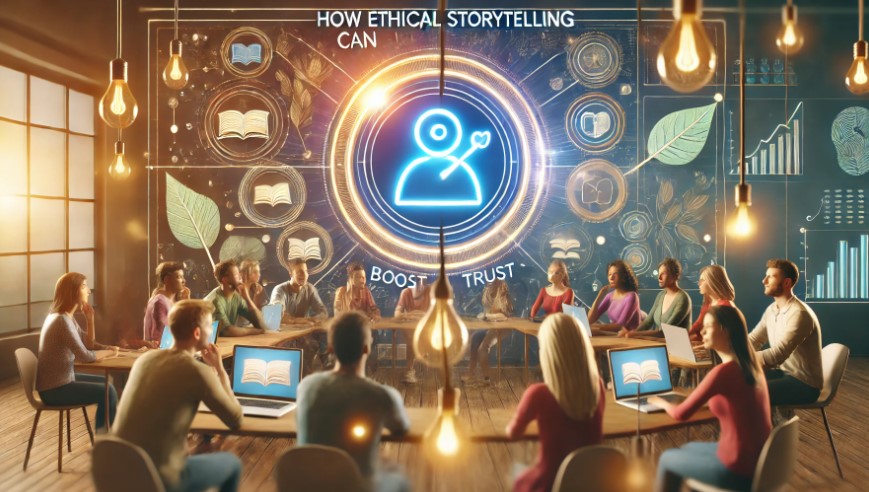Ethical storytelling transcends marketing; it is the art of creating genuine, empathetic, and transparent narratives that respect the dignity of the individuals involved.

In an era defined by digital connectivity, online education has emerged as a transformative force in higher education India.
However, with an increasingly competitive market and diverse learner expectations, building trust has become paramount for educational platforms. Ethical storytelling has risen as a powerful strategy to bridge the trust gap.
By weaving narratives that reflect authenticity, empathy, and transparency, online platforms can connect with students at a deeper level, transforming passive learners into active participants.
Indian students, often navigating unique challenges such as financial constraints, geographic limitations, and language barriers, benefit profoundly from storytelling in education. It humanizes their struggles and aspirations, offering a sense of relatability and hope.
Reports from 2024 by the National Digital Learning Consortium indicate that 63% of Indian students prefer platforms that share relatable success stories, emphasizing the significance of narratives in fostering trust.
With this article, I will try to explain how ethical storytelling enhances trust in online education platforms. It delves into its applications, cultural nuances, and future trends, supported by data and actionable insights.
By understanding the profound impact of storytelling, educational platforms can redefine their approach, ensuring their narratives resonate meaningfully with their audience.
What Is Ethical Storytelling?
Ethical storytelling transcends marketing; it is the art of creating genuine, empathetic, and transparent narratives that respect the dignity of the individuals involved. For online education platforms, this approach serves as a cornerstone for building long-lasting relationships with learners.

In India’s education landscape, storytelling plays a pivotal role in bridging cultural and linguistic diversity. A 2025 report by the All India Council for Technical Education (AICTE) revealed that 71% of Indian students are more likely to trust educational platforms that share culturally relevant and authentic stories.
These narratives often showcase real-life experiences, such as how learners overcome challenges or achieve success through education digital marketing efforts.
Ethical storytelling in education India emphasizes transparency, avoiding exaggerated claims or unrealistic promises. For instance, platforms like Coursera and edX have built credibility by openly sharing the limitations of their programs while celebrating learner achievements.
This honesty fosters trust, especially among discerning Indian students who value authenticity over flashy marketing.
By integrating ethical storytelling, educational platforms not only enhance their reputation but also ensure their content aligns with the values of their audience. It is this alignment that forms the bedrock of trust in an increasingly digital learning environment.
The Role of Ethical Storytelling in Enhancing Learner Engagement
Ethical storytelling has emerged as a transformative tool for enhancing learner engagement in online education.

By weaving narratives rooted in authenticity, empathy, and transparency, educational platforms can captivate students’ attention, fostering deeper connections and sustained interest. Engagement is no longer about flashy visuals or complex algorithms; it is about creating relatable, human-centered experiences that resonate with learners.
For Indian students, who often balance diverse cultural, social, and economic challenges, storytelling bridges the gap between aspirations and reality.
Research by the Indian EdTech Council in 2024 found that platforms utilizing storytelling elements reported a 47% increase in learner engagement compared to traditional instruction methods. Narratives about overcoming obstacles, personal growth, or academic success inspire students, showing them a pathway to their own goals.
Furthermore, storytelling transforms abstract concepts into tangible, relatable scenarios. A business ethics course, for example, becomes more impactful when illustrated through real-life corporate dilemmas, encouraging critical thinking and problem-solving.
Ethical storytelling also fosters a sense of community. When students see their experiences reflected in shared narratives, they feel valued and understood, reducing isolation in digital learning environments.
Transparency and inclusivity are central to this approach. Platforms that highlight diverse perspectives and acknowledge the challenges of learning build trust, leading to higher retention rates and satisfaction.
Ethical storytelling isn’t just a strategy; it’s a bridge to meaningful, lasting engagement, ensuring learners remain active participants in their educational journey.
Building Credibility Through Transparency
Transparency is the foundation of trust in online education platforms, especially in the context of Indian students navigating diverse challenges in their learning journeys.

In an increasingly competitive market, platforms that communicate openly about their offerings, outcomes, and limitations are more likely to establish credibility with learners.
A 2024 survey by the Indian EdTech Transparency Council found that 68% of students prioritized enrolling in courses with clearly stated outcomes and realistic expectations. Ethical storytelling is a vital tool in achieving this transparency.
Platforms can use authentic narratives to communicate success stories while acknowledging the challenges learners may face, such as the need for self-discipline or access to reliable internet.
Transparency also extends to marketing efforts. Avoiding exaggerated claims and presenting honest testimonials builds trust among prospective students. For instance, sharing data on completion rates or the percentage of graduates securing employment provides learners with a realistic understanding of the platform’s impact.
Moreover, transparent communication fosters a sense of accountability. Platforms like edX and Coursera have embraced this by providing detailed course descriptions, skill outcomes, and even limitations of their offerings. This approach resonates deeply with Indian students, who often invest significant resources in their education and demand value for their commitment.
By prioritizing transparency in their storytelling and communication strategies, online education platforms can create a trustworthy and student-centric environment, ensuring long-term success in a dynamic and diverse educational landscape.
Fostering Empathy and Community in Digital Learning
Empathy and a sense of community are essential components of meaningful education, especially in digital learning environments where physical interaction is absent.

For Indian students, who often face cultural, linguistic, and socio-economic barriers, fostering these elements is crucial to creating an inclusive and supportive learning experience.
Empathy in digital learning can be cultivated through ethical storytelling, where online platforms share relatable narratives that reflect learners’ challenges, triumphs, and diverse backgrounds.
For instance, sharing the story of a rural student overcoming obstacles to achieve success can inspire others and build a connection among learners. According to the National Digital Education Study 2025, platforms that integrate empathy-driven narratives report a 38% increase in learner engagement.
Community-building in digital spaces relies on fostering collaboration and interaction. Virtual discussion forums, group projects, and peer-to-peer mentorship programs create avenues for students to connect, share insights, and support each other.
A 2026 survey by the Indian Education Technology Association found that 72% of students felt more motivated when part of an interactive learning community.
Inclusivity is also a critical factor. Online education platforms must ensure that all learners, regardless of their background, feel represented and valued. This involves amplifying diverse voices, creating multilingual resources, and avoiding cultural stereotypes.
By fostering empathy and building a vibrant community, digital learning platforms can not only enhance learner satisfaction but also empower Indian students to thrive in a collaborative and compassionate environment.
Practical Applications of Ethical Storytelling in Online Education
Ethical storytelling in online education transforms the learning experience by fostering trust, engagement, and relatability among learners. This strategy can be applied across multiple areas, from marketing and course design to community building and alumni relations.

In education digital marketing, storytelling helps platforms connect with potential learners on a personal level. Sharing authentic success stories of Indian students, for example, illustrates the transformative impact of the programs offered.
A 2026 study by EdTech India highlighted that 56% of prospective students preferred video testimonials over text reviews, emphasizing the power of relatable, visual narratives.
Within course design, storytelling enhances comprehension and retention. Integrating case studies or real-life scenarios into the curriculum transforms abstract concepts into practical knowledge.
For instance, explaining sustainability principles through stories about rural communities adopting green practices can resonate deeply with Indian students. According to the Digital Learning Consortium (2025), storytelling-driven modules improved concept retention by 39%.
Storytelling also fosters community and inclusivity. Platforms can create safe, relatable spaces by showcasing diverse learner experiences, including underrepresented voices. Highlighting regional successes, such as learners from rural India overcoming challenges, builds a sense of belonging.
Lastly, alumni engagement can be enhanced through storytelling. Sharing updates on graduates’ achievements maintains a lifelong connection and inspires current students. Ethical storytelling applied in these ways ensures online education platforms not only educate but also build enduring trust with their learners, shaping impactful and meaningful educational journeys.
The Ethical Use of AI in Storytelling
Artificial Intelligence (AI) has revolutionized storytelling in education, enabling personalized, adaptive, and scalable narratives that resonate with learners.

However, its use must align with ethical principles to ensure trust and inclusivity in digital learning environments.
One of the most transformative applications of AI in storytelling is personalization. AI algorithms analyze learners’ preferences, progress, and challenges to craft tailored narratives that enhance engagement and comprehension.
For instance, an online education platform might use AI to create a story-based scenario that adapts to a learner’s pace, helping them grasp complex concepts more effectively. A 2024 study by the Centre for AI in Education revealed that 72% of Indian students found AI-driven personalized content more relatable and impactful.
Despite these benefits, ethical considerations must guide AI applications. Data privacy is a paramount concern, as AI systems rely on sensitive learner information to generate personalized stories.
Platforms must prioritize transparency, clearly communicating how data is collected, stored, and utilized. Moreover, avoiding algorithmic bias is essential to ensure that narratives reflect diverse perspectives rather than perpetuating stereotypes.
Human oversight is another critical aspect. While AI can enhance storytelling, it should complement rather than replace human creativity and judgment. A balanced approach ensures that stories maintain authenticity and emotional depth.
By adhering to ethical practices, the education industry can leverage AI to create powerful, inclusive narratives that build trust and transform learning experiences.
Addressing Cultural Sensitivity in Storytelling
Cultural sensitivity is a cornerstone of ethical storytelling, especially in a diverse and multicultural country like India.

With its myriad languages, traditions, and socio-economic dynamics, storytelling in education must resonate authentically with learners from all walks of life. Ensuring cultural sensitivity involves crafting narratives that reflect the diverse realities of Indian students while avoiding stereotypes or generalizations that could alienate or misrepresent certain groups.
A 2026 study by the Indian Council for Inclusive Education revealed that 58% of Indian students felt more engaged with educational platforms that included culturally relevant content.
For example, sharing stories of students from rural areas overcoming geographical barriers to access online education can inspire learners from similar backgrounds. Similarly, highlighting regional success stories in local languages can foster relatability and inclusion.
Cultural sensitivity also means being mindful of gender dynamics, religious beliefs, and linguistic diversity. Using inclusive language and presenting narratives that celebrate varied traditions and perspectives ensures that storytelling appeals to a broad audience.
Platforms must also avoid perpetuating biases or outdated cultural norms, instead showcasing progressive and empowering representations.
Ethical storytelling must further embrace underrepresented voices, ensuring that marginalized communities see their experiences reflected authentically. By fostering a sense of belonging through culturally sensitive narratives, online education platforms can build trust, engagement, and loyalty among learners.
Future Trends in Ethical Storytelling for Online Education
The evolution of technology and the increasing demand for personalized learning are reshaping storytelling in online education.

Ethical storytelling, rooted in authenticity and empathy, is set to transform digital learning experiences, creating deeper connections between platforms and learners. Here’s a glimpse into the future of ethical storytelling for online education.
One emerging trend is the integration of immersive technologies such as Virtual Reality (VR) and Augmented Reality (AR). These tools enable learners to experience narratives in lifelike environments, making complex concepts more accessible and engaging.
A 2027 report by Global EdTech Insights projects a 78% increase in learner engagement on platforms adopting immersive storytelling.
Artificial Intelligence (AI) will also play a pivotal role in crafting hyper-personalized narratives. AI-driven systems can adapt stories based on individual learning styles, preferences, and progress, ensuring relevance and resonance. However, platforms must use AI ethically, prioritizing data privacy, transparency, and fairness to maintain trust.
Cultural inclusivity in storytelling is another key trend. With India’s diverse student base, platforms are increasingly tailoring narratives that reflect varied cultural, linguistic, and regional contexts. Stories that resonate with learners’ unique realities foster inclusivity and emotional connection, addressing key equity goals outlined in India’s National Education Policy 2040.
As ethical considerations gain prominence, online platforms are expected to focus on transparency and inclusivity in their narratives. Future storytelling will emphasize collaboration, where students co-create content, enabling peer-driven learning and shared ownership.
Incorporating these trends, ethical storytelling will not only enhance engagement but also redefine how education is delivered online. By aligning with technological advancements and ethical principles, storytelling in online education can inspire a generation of learners to thrive in an increasingly connected world.
Conclusion
Ethical storytelling is not just a tool; it is a transformative approach that redefines trust, engagement, and inclusivity in online education.
For Indian students navigating diverse challenges, storytelling bridges the gap between aspirations and opportunities, creating meaningful connections with educational platforms. By integrating authentic narratives, platforms can inspire learners, foster empathy, and enhance retention.
Future trends like AI-driven personalization, immersive technologies, and culturally inclusive storytelling will further elevate the impact of storytelling in education. These innovations must, however, be rooted in transparency, ethical practices, and a commitment to respecting learner privacy.
As we advance toward a digitally connected learning ecosystem, ethical storytelling will remain pivotal in shaping transformative educational experiences.
By embracing these principles, online education platforms can build lasting trust and inspire a generation of learners to achieve their goals.
How will your platform leverage the power of ethical storytelling to lead this change?


